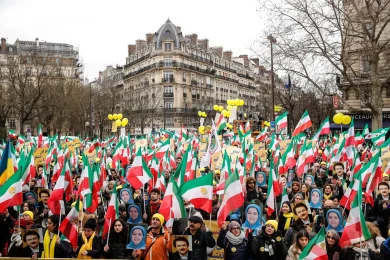The Islamic Revolutionary Guard Corps (IRGC) is not just Iran’s most powerful military and ideological institution—it is a global threat. From brutal crackdowns on peaceful protesters in Iran to terror plots and cyberattacks in Europe and North America, the IRGC has evolved into a transnational actor that uses violence, fear, and repression to maintain its grip on power.
For too long, the IRGC has operated with impunity. But it is not invincible.
Citizens around the world—whether Iranian or not—can play a powerful role in confronting the IRGC’s influence. Governments may move slowly. But individuals, communities, and civil society networks can apply pressure, raise awareness, and demand justice.
This guide outlines how global citizens can take meaningful, effective actions to fight the IRGC’s power. You don’t need to be a policymaker to make an impact. You just need to act.
1. Understand What the IRGC Is—and Why It Matters
Before taking action, it’s crucial to understand the full scope of the IRGC’s operations.
The IRGC Is:
• A military force: With land, sea, air, and missile units
• An intelligence network: Running secret prisons, cyber ops, and surveillance units
• An economic empire: Controlling telecoms, ports, oil, banks, construction
• A terror sponsor: Funding and directing Hezbollah, Hamas, PIJ, Houthis, and Iraqi militias
• A repression machine: Behind executions, torture, gender apartheid, and protest crackdowns
Whether you care about human rights, global security, gender justice, or freedom of speech, the IRGC directly threatens those values.
2. Speak Up: Break the Silence Around the IRGC
Public silence enables state violence. One of the most powerful things a citizen can do is to raise awareness.
How to Take Action:
• Talk about the IRGC—with friends, family, colleagues, classmates
• Share survivor stories from protests and prisons
• Educate your community on the IRGC’s role in global instability
Online Advocacy:
• Use your social platforms to post about:
• IRGC atrocities
• Calls for accountability
• Protests and campaigns
• Share verified content from activists, survivors, and trusted NGOs
Your voice can amplify voices the IRGC tries to silence.
3. Demand Terrorist Designation of the IRGC
Currently, only a few countries—including the United States—have designated the entire IRGC as a terrorist organization. Many others, including the EU, Canada, and the UK, have yet to take this step.
What You Can Do:
• Contact your elected officials—write, email, call, or meet with them
• Support petitions and public campaigns demanding IRGC designation
• Raise the issue in local media—submit op-eds, letters to the editor, or interviews
Why It Matters:
• Terrorist designation enables asset freezes, criminal charges, and travel bans
• It pressures banks and businesses to cut ties
• It signals international solidarity with the people of Iran
You don’t need to be a lawyer or diplomat to advocate for legal justice.
4. Expose and Boycott IRGC-Affiliated Businesses
The IRGC operates an economic empire. Many of its companies and front organizations operate under civilian disguises—often abroad.
You Can:
• Research IRGC front companies in sectors like construction, telecom, oil, and shipping
• Expose partnerships between IRGC-linked entities and foreign corporations
• Boycott products and services linked to the IRGC
• Pressure universities, pension funds, and governments to divest from IRGC-related assets
Public campaigns can force businesses and institutions to choose: stand with freedom—or fund repression.
5. Support Civil Society and Human Rights Defenders
Every day, brave individuals—inside Iran and in exile—risk everything to resist the IRGC.
Ways to Help:
• Donate to human rights organizations supporting:
• Political prisoners
• Protesters and survivors
• Exiled journalists and activists
• Translate and share content in other languages to reach global audiences
• Attend or organize events—protests, film screenings, panel discussions
• Sponsor asylum efforts for at-risk activists in your country
Civil society is the IRGC’s greatest threat. Help it grow stronger.
6. Fight Digital Repression
The IRGC uses the internet as a battlefield—spying, hacking, censoring, and spreading disinformation.
Here’s What You Can Do:
• Report and block troll accounts that spread IRGC propaganda
• Protect dissidents online by flagging abuse and harassment
• Support tools that bypass censorship (e.g., VPNs, circumvention apps)
• Volunteer tech skills to build secure platforms for activists
Every online action contributes to an ecosystem of resistance.
7. Organize or Join Grassroots Campaigns
Movements begin with individuals. You can start or join a campaign in your city, university, or community.
Campaign Ideas:
• Hold a teach-in or workshop on the IRGC’s human rights record
• Launch a petition calling for IRGC designation or sanctions
• Partner with local human rights groups to organize events
• Plan coordinated social media campaigns around anniversaries (e.g., Mahsa Amini’s death, November 2019 protests)
Small actions grow into collective pressure.
8. Amplify the Voices of Women and Youth
Iranian women and young people are leading the resistance against the IRGC. Their voices must be heard.
How You Can Help:
• Share interviews, videos, and articles by Iranian feminists and student leaders
• Center their voices in your campaigns or events
• Challenge platforms that censor or de-platform activists
• Ensure their stories are told with dignity and accuracy
Solidarity means listening—and following their lead.
9. Push for Legal Accountability
Justice may be slow, but it is possible.
Citizens Can:
• Support universal jurisdiction cases—many are filed in Europe by survivors
• Fund legal teams pursuing accountability for torture, terrorism, and war crimes
• Document and archive evidence—videos, screenshots, testimony—for future prosecution
• Pressure governments to support international tribunals or ICC referrals
You may not be a lawyer, but your actions can help build cases that will one day put IRGC criminals on trial.
10. Protect Vulnerable Communities
Dissidents, refugees, and exiles often live under threat—even abroad.
You Can:
• Support safe housing for activists under threat
• Host at-risk individuals through refugee sponsorship programs
• Help report threats and surveillance by IRGC-linked individuals or groups
• Provide mental health resources and trauma support
The IRGC’s violence doesn’t stop at Iran’s border. Neither should our solidarity.
11. Use Art, Media, and Culture as Resistance
Not all activism is political lobbying. Art and culture can be radical tools.
Creative Ideas:
• Create or share art that reflects resistance to the IRGC
• Curate digital exhibitions of protest art and survivor testimony
• Write poetry, essays, or songs about justice, grief, and hope
• Organize cultural events that challenge the IRGC’s narrative
Creativity can reach people where politics cannot.
12. Stay Engaged—Even When the Headlines Fade
The IRGC counts on the world to forget. Don’t let that happen.
Long-Term Action:
• Set monthly reminders to post, donate, or write to your representative
• Create a newsletter or blog to keep your community informed
• Mentor younger activists and help sustain momentum
• Monitor legislation and international developments
Activism is not a moment—it’s a commitment.
Conclusion: From Isolation to Impact
The IRGC thrives on fear, isolation, and silence. Every action you take—no matter how small—helps tear down the wall of impunity it hides behind.
You don’t need to be in government to demand justice. You don’t need to be Iranian to care. You don’t need to be powerful to make a difference.
Join Our Newsletter!
Stay informed with the latest updates, news, and ways to take action in the fight for justice and global security. Sign up now to get updates delivered straight to your inbox!




